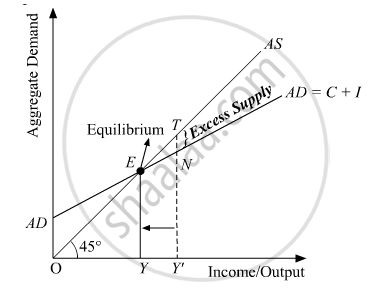Advertisements
Advertisements
Question
Discuss the adjustment mechanism in the following situation :
Aggregate demand is lesser than Aggregate Supply.
Solution
Aggregate demand is lesser than Aggregate Supply:
In case, if AS > AD, then it implies a situation, where the total supply of goods and services is more than the total demand for goods and services. This implies a situation of deficit demand. Due to the deficit demand, the producers experience piling-up of stock of unsold goods, i.e. inventory accumulation. This would force the producers to cut-back the production, thereby results in the reduced employment of factors of production. This leads to a fall in income and output. Finally, the income and output will fall sufficiently to equate the AD with AS, thus the equilibrium is restored back. This process of adjustment mechanism is explained below graphically.

In the figure, AD and AS represent the aggregate demand and aggregate supply curves. Let us suppose that the equilibrium is operating at a situation, where aggregate supply exceeds aggregate demand, i.e. AS > AD. TY´ represents the aggregate supply of output in the economy but the aggregate demand is only NY´. Hence, the economy is facing deficit demand or excess supply equivalent to TN (i.e. TY´ – NY´). Due to the excess supply, the producers experience stock of unsold inventories. Consequently, they cut-back their production and reduce employment. This results in a fall in production and employment. The income, output, and employment will continue to fall until all the excess supply is wiped-out. This happens at equilibrium point E, where AD and AS intersect each other. At the equilibrium, OY represents the equilibrium level of output and income.
APPEARS IN
RELATED QUESTIONS
Given consumption curve, derive saving curve and state the steps taken in the process of derivation. Use Diagram.
Explain the concept of 'excess demand' in macroeconomics. Also explain the role of 'open market operation' in correcting it.
What is meant by inflationary gap?
Explain the role of Cash Reserve Ratio in removing an inflationary gap
Explain the role of 'Open Market Operations' in reducing Deflationary Gap
Explain the determinants of aggregate supply.
Fill in the blank with appropriate alternatives given below
The General Theory of Employment, Interest and Money was written by __________.
Match the following Group:
| Group A | Group B | ||
| 1) | Aggregate Supply | a) | Expected receipts |
| 2) | Autonomous Investment | b) | Lord J. M. Keynes |
| 3) | Consumption | c) | Government Investment |
| 4) | A.P.C. | d) | ΔC/ΔY |
| 5) | Investment | e) | C/Y |
| f) | Addition to stock of capital | ||
| g) | Destruction of utility | ||
Define or Explain the following concept:
Aggregate Demand
Give reason or explain.
Aggregate demand is a positive function of the level of employment and output.
Answer the following question.
State and discuss the components of Aggregate Demand in a two-sector economy.
Answer the following question.
What is meant by the "Effective Demand Principle" in the Keynesian theory of employment? Discuss using a schedule or a diagram.
On which concept does classical viewpoint depend?
An increase in aggregate demand of equilibrium level of income and employment causes an increase in ______
What is meant by Equilibrium income?
When the value of the currency falls as compared to other currencies, it is ______
A decrease in Cash Reserve Ratio will lead to ______
What is the circumstance when aggregate output is determined solely by the level of aggregate demand called?
If TR is 1,00,000₹ when ₹20,000 units are sold, then AR is equal to:
With reference to Simple Keynesian model, give the meaning of ex-ante demand.
